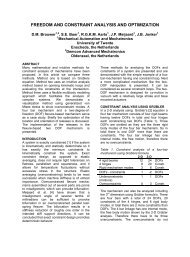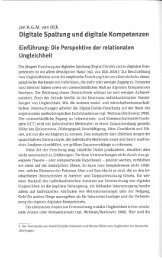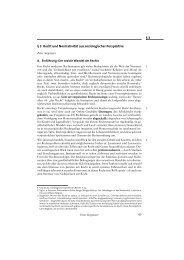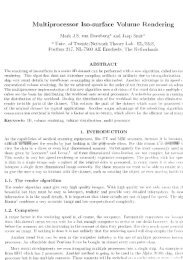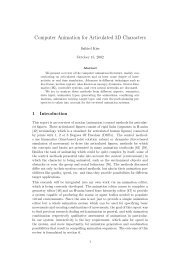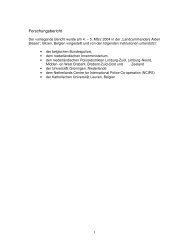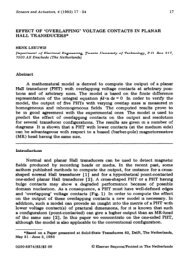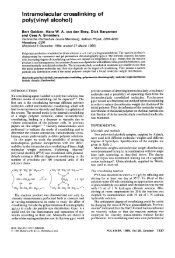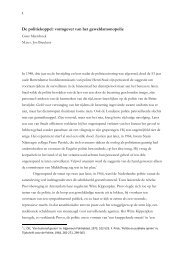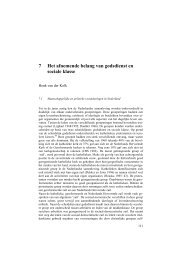Innovation and institutional change: the transition to a sustainable ...
Innovation and institutional change: the transition to a sustainable ...
Innovation and institutional change: the transition to a sustainable ...
You also want an ePaper? Increase the reach of your titles
YUMPU automatically turns print PDFs into web optimized ePapers that Google loves.
154 Chapter 5<br />
Prospects for cogeneration<br />
Dutch public authorities are not optimistic regarding <strong>the</strong> fur<strong>the</strong>r increase of<br />
cogeneration under liberalization. The over capacity in <strong>the</strong> (European)<br />
electricity market <strong>and</strong> expected electricity price decreases are expected <strong>to</strong><br />
worsen <strong>the</strong> national climate for investments in cogeneration. The open<br />
access <strong>to</strong> ra<strong>the</strong>r cheap coal <strong>and</strong> nuclear-based electricity in Europe has<br />
negatively affected <strong>the</strong> competitiveness <strong>and</strong> profitability of cogeneration.<br />
The pessimism is fur<strong>the</strong>r fuelled by <strong>the</strong> idea of maturity of <strong>the</strong> potential of<br />
cogeneration in Dutch industry. The political goal of 15.000 MWe<br />
cogeneration in 2010 is conceived as <strong>to</strong>o ambitious by a range of ac<strong>to</strong>rs<br />
(Arentsen, Hofman, Marquart, 2000). O<strong>the</strong>r ac<strong>to</strong>rs tend <strong>to</strong> stress <strong>the</strong><br />
strengths of cogeneration in a liberalised market (Arentsen, Hofman,<br />
Marquart, 2000):<br />
– The flexibility of cogeneration with respect <strong>to</strong> energy supply (heating,<br />
cooling, electricity, emergency power, etc.) will pay off in <strong>the</strong> form of<br />
higher returns. The tariff structure will no longer be based on st<strong>and</strong>ard<br />
costs, but on <strong>the</strong> real costs of <strong>the</strong> moment;<br />
– Remote control systems will become more important, especially for<br />
distribution companies, because it enables <strong>the</strong>m <strong>to</strong> utilise decentral<br />
installed capacity <strong>to</strong> get <strong>the</strong> highest returns on <strong>the</strong>ir electricity production;<br />
– Cogeneration units have a short construction time <strong>and</strong> relative short<br />
payback periods. This can be an important asset in <strong>the</strong> changing energy<br />
market of <strong>the</strong> Ne<strong>the</strong>rl<strong>and</strong>s;<br />
– The concept of cogeneration still offers room for <strong>the</strong> improvement of<br />
efficiency, for instance in combination with st<strong>and</strong> alone heat pumps <strong>and</strong><br />
by adding technology (absorption coolers) <strong>to</strong> produce coldness in<br />
summertime;<br />
– Powerful ac<strong>to</strong>r coalitions (Gasunie, distribu<strong>to</strong>rs, equipment producers)<br />
have formed a coalition <strong>to</strong> develop <strong>and</strong> diffuse micro cogeneration units<br />
<strong>to</strong> <strong>the</strong> level of houses <strong>and</strong> neighbourhoods in order <strong>to</strong> safeguard <strong>and</strong><br />
exp<strong>and</strong> <strong>the</strong>ir market positions (sale of gas, number of connections, sale of<br />
equipment respectively).<br />
Table 5.6 provides an overview of main patterns of <strong>change</strong> at <strong>the</strong> structural,<br />
macro-level, meso-level of network formation <strong>and</strong> emerging <strong>institutional</strong><br />
arrangements <strong>and</strong> micro-level of ac<strong>to</strong>rs, <strong>the</strong>ir routines <strong>and</strong> competences. If<br />
we contemplate <strong>the</strong> various dimensions of sociotechnical configuration for<br />
electricity supply <strong>and</strong> use <strong>the</strong> process of liberalisation of electricity markets<br />
has impacted all fields <strong>and</strong> reinforced <strong>the</strong> market orientation of cogeneration.<br />
Contracts for remuneration have <strong>to</strong> be negotiated with individual buyers, <strong>and</strong><br />
rules for grid connection <strong>and</strong> grid transport tariffs deteriorated conditions for<br />
cogeneration, <strong>and</strong> were later renegotiated. Opening up of markets led <strong>to</strong><br />
<strong>change</strong>s in competitive forces for cogeneration, as gas-based cogeneration



